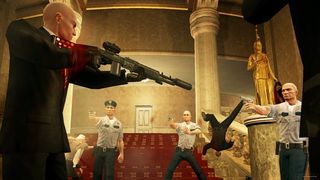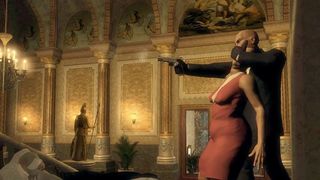Where many open-world action games are akin to sandboxes, Hitman: Blood Money is perhaps best viewed as a series of toy boxes. Each level is relatively small in scale, its parameters easily defined, but the possibilities for inventive play are numerous. The game offers several testing grounds for crazy assassination ideas, whether that’s working out the ones the developers have designed and signposted, playing out scenarios cooked up entirely within your mind, or setting up old-fashioned shootouts.

The game’s third mission, Curtains Down, is set in the Paris Opera during a rehearsal. The targets are Alvaro D’Alvade and Richard Delahunt, lovers who are involved in a child smuggling and prostitution ring. When Agent 47 arrives on the premises, D’Alvade is rehearsing the execution scene of the suitably dark Tosca on the stage, while Delahunt watches from his private box.
There’s a brilliant method for taking these men down, even if the logic behind it is esoteric. You can sneak backstage and replace a fake prop WWI pistol with a loaded gun (discreetly hidden in the pocket of a jacket waiting for you in the cloakroom). The execution scene will end far more gruesomely than intended, and Delahunt will, in his confused horror, run towards the stage to get to his deceased lover. He trips midway there, at which point the well-prepared player will set off the bomb they’ve rigged to the overhead chandelier, crushing Delahunt in what the papers will write off as a pair of bizarre coincidences; perhaps they were the handiwork of a suitably operatic phantom. No one will know what really happened bar 47, who can access a private balcony from the roof and witness this scheme unfold without fear of suspicion.
But in Blood Money, perfect murders are rare. If the series made these crimes easy, it would lose much of its sense of dark comedy, as well as the chaotic dramatic escalation that’s integral to so many good yarns about murder. Some of the best moments in Blood Money are the ones in which everything goes horribly wrong, a lesson Curtains Down is particularly intent on teaching you.

After the tutorial’s amusement park and the enormous mansion-cum-winery of the second level, the Paris Opera seems comparatively contained. Its different areas are divided up by the game’s class system: a maintenance uniform is enough to get you backstage; a police outfit opens up your options; and a private security uniform, which is tricky to get quietly, will get you the highest access possible. Even so, the paranoia of your targets means getting right up close to them is never easy.
Agent 47, a stern, well-dressed man with a serious face and confident walk, is the kind of person who should come across as being right at the top of the Paris Opera’s food chain. While it’s sometimes questionable when he shows up for a job wearing his trademark dark suit, it makes perfect sense here. But the Hitman games often toy with the idea of how class and privilege operate with their costume changes. In a world where a well-tailored suit opens some doors, it’s really the ugly green maintenance uniform – best acquired early by quickly sedating a poor workman as he goes to the toilet – that gets 47 the fastest access to the backstage area.

That backstage zone can at times seem like a labyrinthine nightmare. The majority of the space is irrelevant; the theatre exists independently of your mission, full of workmen, garbage, and pieces of various sets. In some ways, it’s pleasing to be allowed to be disorientated – the game doesn’t simply lock every door that you don’t need to walk through. But it’s easy to be thrown off balance by a level that could, for many players in 2006, only be navigated easily if their screen was big enough to make the signs pointing towards the dressing rooms noticeable.
A first-time player has little hope of replacing the gun and rigging the chandelier to drop before the first rehearsal is complete, and for those unaware that the rehearsal is repeated, D’Alvade’s performed, non-fatal execution can be a moment for panic – an indication that the plan has failed. It’s no wonder the WWI pistol that 47 is carrying contains nine bullets when D’Alvade’s death only requires a single shot. Panic may not be ideal for a good assassination, but the Paris Opera seems designed to encourage you to think on your feet and take opportunities as they come.
Deviate from the plan and getting at either target with a gun usually means entering the theatre proper. It’s the most open area of a level filled with corridors and small rooms. The overspill of violence from the stage or screen into the audience is a common enough theme, but this scenario brings its own sense of franticness. Escaping through the exit, having battled your way out over balustrades and plush red seats, can be far more thrilling than any ironic execution.
The flawless path through the Paris Opera, as with so many stealth games, is all about perfecting your slink and timing your movements perfectly. But it’s no mistake that the level in which you ruin an opera is also the one that best exemplifies how well the game works when planned performances go awry, and that best explores the deeper elements of class structure that lie at the core of the series.

Whether you fail or succeed at pulling off a ‘silent’ assassination, a show – either yours or theirs – is ruined in spectacular fashion. And that’s what Hitman: Blood Money is really all about. And it's that essence of a level that the new Hitman game (out this December) will have to work hard to recapture.
Read more from Edge here. Or take advantage of our subscription offers for print and digital editions.

